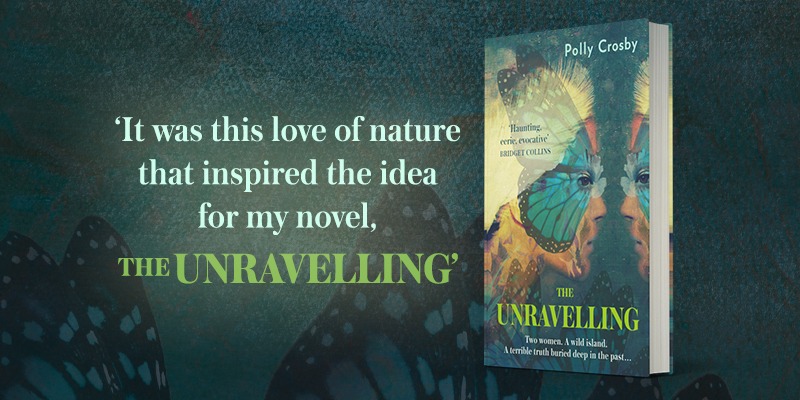To celebrate the release of her atmospheric historical mystery, The Unravelling, Polly Crosby explores how her fascination with nature inspired the idea for the book.
I’ve always been fascinated by nature. I was the kind of child who made dens and rooted around in the earth in search of insect cocoons. I have a particular memory of an encounter with a strangely glowing bug that wriggled away before I could look at it properly, leaving me blinking in astonishment. To this day I don’t know if it was real or imagined.
It was this love of nature that inspired the idea for my novel, The Unravelling. I love the way nature endures whether we are there or not: the sudden emergence of a toadstool overnight, the way a sunflower tracks the sun across the sky. But what intrigues me the most is when humankind and nature overlap.
Many years ago, two lovers carved their names in the trunk of a tree that I walk past often. In the intervening years, time has changed it, the bark thickening and growing, covering up the names so that they are partly hidden inside the tree. I love this about nature: that when left to its own devices, it can take over, burying our secrets.
My childhood family home is by the sea, and my parents still live there now. When I go back to visit, I always go straight to the beach, remembering the years I spent there as a child. As I walk along the shore, the tide washes the sand clean, erasing my footprints, removing any clue that I was ever there at all. At low tide, the fragmented wooden struts of an ancient old pier reveal themselves, reaching up from the waves like grasping fingers, and in the winding muddy creek near my family home, the great ribs of a sunken old fishing boat appear, just as they have done twice a day on the ebb tide for decades. There is a silent war between the water and the wood. One day, the boat and the pier will no longer be there at all, but the victorious river and the sea will endure.
Near to my family home in Suffolk, there is a spit of land called Orford Ness. It is a place of wild, eerie beauty. In the twentieth century, the MOD took it over, using it for many secretive purposes that even today are not fully explained. In the 1990s, it was passed to the National Trust, who began the extensive task of rewilding it. It is now accessible to the public, and an internationally important site for nature conservation. When you step off the boat that takes you there, you can still see the concrete structures that the military left behind, cracked and crumbling and filled with the hooting lament of owls and the shriek of raptors. Everything here is silent and eerily overgrown, like a post-apocalyptic world.
This is what intrigues me the most, and what is at the heart of The Unravelling: when nature is allowed to creep back, taking over and covering up the scars that humankind has left behind, it is easy to forget that anything happened there at all. But the scars that we leave can never fully be erased. However wild and beautiful a place is, beneath the call of birds and the gentle ripple of marram grass in the breeze, you can still feel the secretive darkness of what happened here years ago.
The Unravelling is out now in hardback, eBook and audio.



